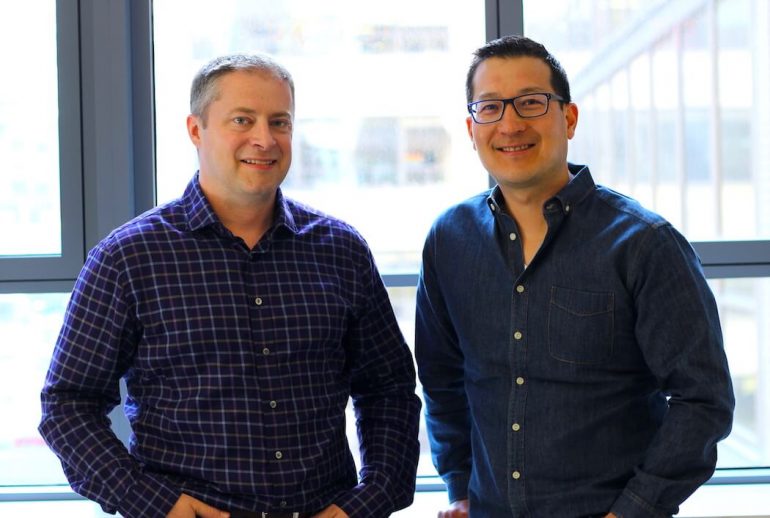Nudge.ai, the Toronto customer relationship management (CRM) startup that shut down in January, has sold a number of its assets to US-based Affinity.
Nudge.ai, led by Paul Teshima and Steve Woods (former Eloqua executives), publicly announced the shut down in mid-January, citing difficulty raising new capital needed to extend its runway.
We didn’t just run into a wall and file for bankruptcy … we made a conscious decision to do something a little more structured.”
– Paul Teshima, Nudge.ai
Now, Nudge.ai’s assets have been bought by a San Francisco-based competitor, fellow CRM startup Affinity. Affinity acquired Nudge.ai’s technology, its intellectual property, and the majority of its engineering team as well as a member of its product team. Affinity has not disclosed the financial terms of the deal.
Speaking to BetaKit, Teshima explained that following the announcement of Nudge.ai closing up shop it saw a fair amount of interest from parties wanting to acquire its technology.
“We said, ‘yeah, for the right company with the right sort of direction … it would make sense,’” Teshima said. “So when Affinity came by, it was a great match … both Steve and I thought it was a really good opportunity to let Nudge live on in a different business that’s attacking a similar market.”
Affinity was founded in 2014, the same year as Nudge.ai, and offers a platform that (using artificial intelligence) collects and analyzes data to build better network relationships. Similarly, Nudge.ai had developed an AI-based revenue intelligence platform for sales teams, used to identify gaps in stakeholder relationships, with the goal of finding and increasing pipeline attrition.
RELATED: Nudge.ai hopes artificial intelligence will help build better human relationships
“With their innovative relationship intelligence algorithms and a talented development team, the Nudge.ai acquisition puts us in a better position than ever to bring crucial relationship intelligence to every professional that relies on their network for success,” said Ray Zhou, Affinity’s CEO.
The US company plans to keep Nudge.ai’s existing office, based in OneEleven, and plans to use the location to gain a foothold in Canada. Affinity noted plans to grow its technical team and expand operations from Toronto. The space will mark Affinity’s first international office.
When Teshima and Woods announced the closure of Nudge.ai in January, the original plan was to shut down the company’s Toronto office, with no immediate plans to sell. At the time, the co-founders expressly called on the local tech community to find new jobs for Nudge.ai’s employees who had been affected by the company shutdown.

“We saw [Affinity acquiring Nudge.ai] like a one plus one equals three opportunity,” Teshima told BetaKit, explaining that the decision to sell was twofold: a way to let Nudge.ai’s technology live on and a desire from the company’s engineering team to continue their work within a new company.
“It feels good in a way. There’s nothing worse than working at something for five-plus years and then just seeing it go to nothing,” said Teshima. “So the idea that [Nudge.ai] can live on and add value in a market, and maybe in a slightly different way, is … as good a story as it could be shutting down a company.”
“I think the opportunity to still get something out of this company, because we didn’t just run into a wall and file for bankruptcy, was because we made a conscious decision to do something a little more structured at the end,” he added.
In January, Teshima and Woods attributed the decision to shutter Nudge.ai to a “combination of things” that led to “a challenging next raise and next option.” Teshima explained that instead of driving the company into bankruptcy they made a decision to stop operating once they realized it wasn’t viable to continue on. With some money left in the bank, Nudge.ai has been able to pay off all its bills, with remaining funds going to shareholders.
“We saw [Affinity acquiring Nudge.ai] like a one plus one equals three opportunity.”
Teshima attributed Nudge.ai’s shut down to the company taking too long to pivot to what he called its final solution. “We only really started selling the solution, it was getting traction in 2019, and because of that, there were some challenges in raising based on just the economics of it,” he explained.
“We only really focus[ed] on this one area, which was relationship intelligence, and I don’t know that on its own was going to get the product-market fit without more functionality around it,” Teshima told BetaKit. “I think it was a combination of, we took too long to pivot to this focus area and then maybe we needed to quickly expand some of the use cases a little faster.”
While viewed as competitors, Nudge.ai and Affinity have their differences. Affinity provides a more fulsome CRM product, with Teshima noting that Nudge.ai’s focus was smaller. Teshima also pointed to Affinity’s traction with early venture capital and private equity as a differentiator between the two startups.
During its lifespan, Nudge.ai raised $10 million CAD, with investors that included OMERS Ventures and personal investors Jill Rowley, a previous investor in Eloqua, Neal Dempsey of Bay Partners, and Brad Woloson, former general partner at JMI Equity. Comparatively, Affinity has raised more than $40 million USD to date, with its latest round in February 2019 bringing in $26.5 million USD in Series B funding. Affinity’s investors include Advance Venture Partners, 8VC, Sway Ventures, Mass Mutual Ventures, Pear Ventures, Great Oaks Venture Capital, and Western Technology Investment.
Affinity plans to use Nudge.ai to accelerate the launch of a new version of a sales product, that is due to come out later this year. Teshima and Woods are set to join Affinity as advisors.
Teshima added that he and Woods will continue to work to ensure they “properly wind up [Nudge.ai] the right way.” And while they will work in an advisory capacity at Affinity will be taking a step back to assess their next moves.
“We’re taking the right break so that we can make the next decision on what we want to do,” he said. “But certainly it’s going to be in tech and I’m definitely sticking around in Toronto. I love the city and want to make sure it continues to grow.”


